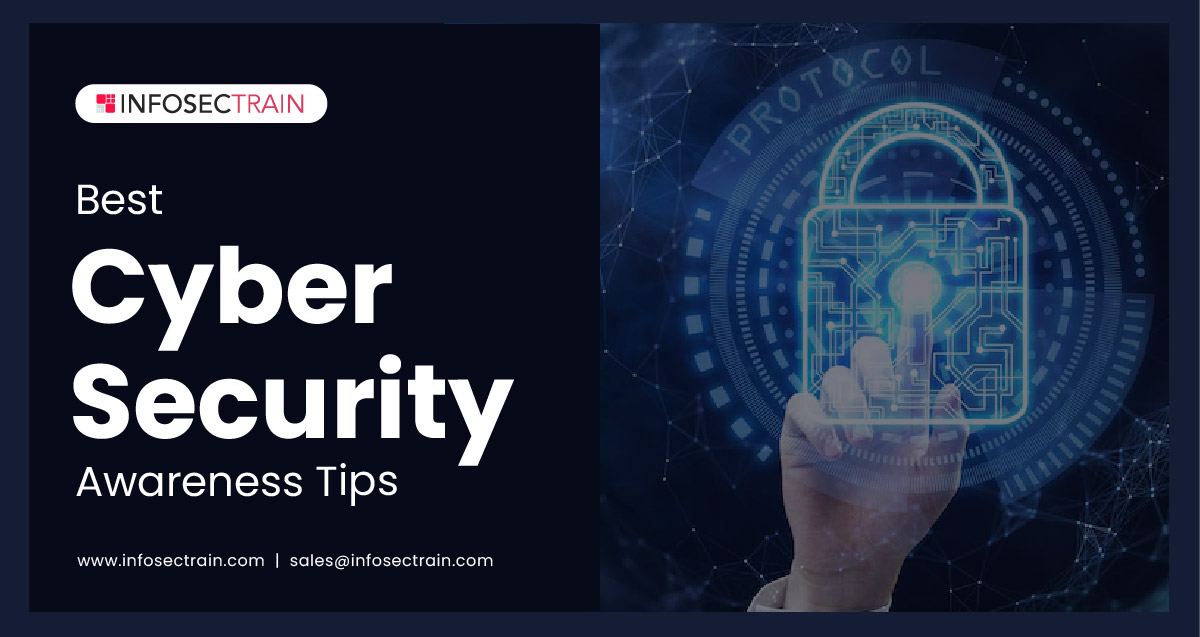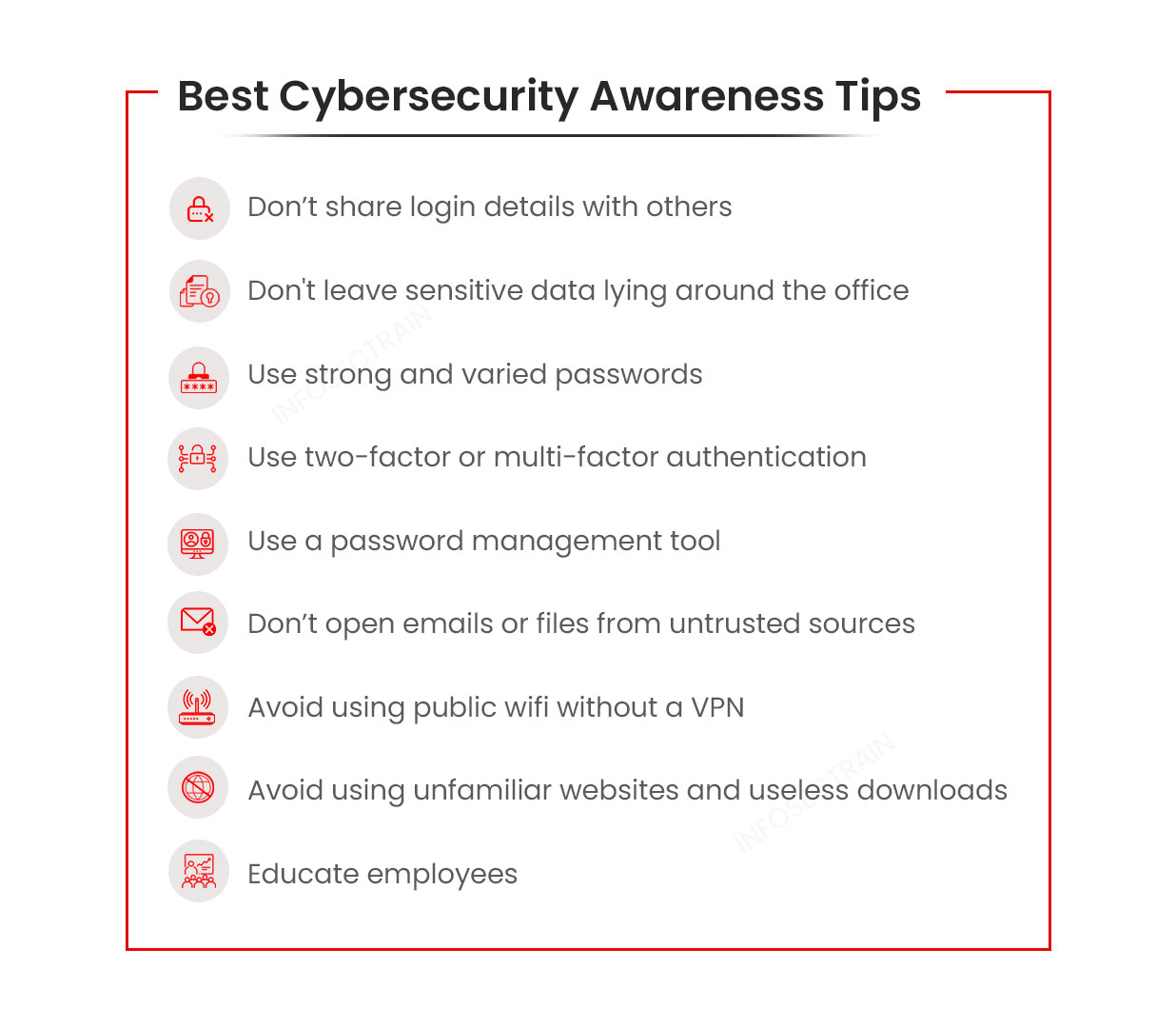Best Cyber Security Awareness Tips
In this digital world, we share and store our private information, making it more accessible to anyone using the internet. What if this shared information falls into the wrong hands, regardless of what information we exchange? Sometimes we take it lightly. However, today more and more severe cyberattacks are occurring than before. You might have heard the news that a single click on a malicious link has resulted in data loss or financial loss. Therefore, these cyber attacks are not meant to be taken lightly. Attackers can use this information to exploit users and organizations of all sizes. A successful cyber attack would be disastrous for individuals or organizations.

Did we notice the fact that many data breaches occur because individuals or organizations have left the main door open when it comes to technology? As a result, the number, diversity, and complexity of cyber threats have grown, damaging an organization’s reputation and customers.
Top Cyber Attacks in 2022
There is no uncertainty that cyber attacks are on the rise, with a current spike related to the pandemic and another rise anticipated. According to TechTarget, this rise would result in attackers obtaining more than 33 billion records by 2023, a 175% increase from 2018. Let us look at these top cyber attacks.
- com: At the beginning of 2022, crypto.com released a statement that their monitoring system had detected unauthorized crypto withdrawals, affecting 483 people’s cryptocurrency wallets. The attackers managed to authorize the financial transactions and overcome the site’s two-factor authentication. The total amount of unauthorized withdrawals was 4,836.26 ETH, 443.93 BTC, and about US $66,200 in other currencies.
- Red Cross: This attack was discovered in January 2022 and resulted in the data theft of over 515,000 vulnerable persons.
- The Works: The Works was forced to shut down 5 locations on April 5, 2022, due to a cyberattack. The attack also resulted in delays in order deliveries to clients and stock replenishment.
- British Army: After a cyber-attack, the British Army’s online recruitment platform was shut down for more than a month, and more than 100 army recruits’ personal information was sold on the dark web.
Even though it is evident that cyber attacks are on the rise, security is now a top concern for individuals or organizations. We can see in these attacks that organizations are paying hefty fines or even going out of business due to a system breach. Do you ever think about how we can prevent these attacks by taking small steps to protect individual’s or organization’s personal information from attackers? And the answer is practicing the best cybersecurity measures we have mentioned in the upcoming section of this article. So here are the best cybersecurity awareness tips which you can follow:
Best Cybersecurity Awareness Tips

1.Don’t share login details with others
Do you share your private social media account login information with others? If this is the case, you must stop. Here is why:
One of the challenges in today’s digital life is keeping track of all the social media accounts that most of us now have. According to Experian, a credit monitoring organization, people between the ages of 25 and 34 open an average of 45 accounts per email address. However, only five unique passwords were used by each user across those 40 accounts. This terrible password habit appears when there is a new data breach with compromised user information. Your organization or another individual, like a customer, is in danger when employees bring these poor behaviors into their workplaces. Therefore, stay cautious of sharing login details with others; this is one of the essential tips you can employ and use regularly to keep data secure from cyber-attacks.
2. Don’t leave sensitive data lying around the office
The average personal computer or commercial workstation is full of data the customer is blissfully naive of. Even many IT professionals are unaware of how much recoverable data is found in virtual gaps and corners. Therefore, data security is a critical component of any successful business. Particularly for industries reliant on technology. It is a responsibility that falls on the management and the individual units of an organization – the personnel. Each individual is critical to the company’s operation. As a result, everyone must know the importance of securing their work and the tools they employ to carry out those tasks. So, you should never leave any sensitive information or data on your computer at the office if you do not use basic security procedures.
3. Use strong and varied passwords
We all know how crucial it is to have a strong and varied password. Still, regrettably, it is one of those topics we do not take too seriously unless something unexpected happens with individuals or organizations. We all know that the average individual uses a system, as well as has roughly 10-15 accounts on various websites, but do you know that they only use five passwords for all of them? Isn’t it easy for attackers to crack those passwords, which they can use to gain access to various accounts? So, adhering to password best practices can protect you and your organization from cyber-attacks. You can employ simple password etiquette like always using a different password, creating complex passwords, never sharing your passwords, and never writing your passwords on paper, which can save you time and trouble.
4. Use two-factor or multi-factor authentication
Generally, you require only a username and password to sign in to the account. What if an attacker or a stranger knows your username and password? Isn’t it an easier way to hack any organization or individual account? Although it is wise to use strong passwords, do you think strong passwords are good enough to secure your organization from data theft or unauthorized access? Therefore, cybersecurity professionals encourage using multi-factor authentication that enables us to add additional layers of security to the usual method of using usernames and passwords for online verification. You can use multi-factor authentication to add additional authentication methods to your accounts, such as a password, PIN, token, verification code in text or emails, biometrics, etc.
5. Use a password management tool
The overwhelming majority of individuals or organizations use exceptionally weak passwords and repeat them across several websites. How are individuals supposed to create secure, one-of-a-kind passwords for every website they visit? Using a password management tool, store and keep track of individual login credentials for all the websites you visit and auto-generate secure passwords for users. It also reduces the risks of falling victim to online traps by not automatically allowing information to fill in while visiting a fraudulent website. It allows individuals to log in to various accounts while decreasing the likelihood of individuals developing lousy password practices, such as writing down passwords or using the same password for multiple accounts.
6. Don’t open emails or files from untrusted sources
Email attacks like phishing are the most common type of method used by cybercriminals to reach out to organizations and individuals to launch cyberattacks. Malware is typically distributed by simply clicking on a malicious email link or website. Even if it is from someone you know, do not open attachments or click on links until you are certain they are safe. Be especially cautious of attachments with flashy names, emails with misspellings, or messages that attempt to convince you to click on a link or file.
7. Avoid using public Wi-Fi without a VPN
You can connect to public Wi-Fi practically anywhere, which is really convenient. At the airport, the hotel, the cafe or the restaurant, the train, the school, or even the streets. Isn’t it simple? But is it wise to access an unencrypted public Wi-Fi network? Although public Wi-Fi was once a remarkable feature, nowadays, it is simple for attackers to target individuals and organizations using public Wi-Fi since Wi-Fi stations are locations where attackers can target you and access private information. They can also be used for hackers to spy on you, much like all the other free services that cost later. So avoid using public Wi-Fi without a VPN. A VPN, when connected to a public Wi-Fi network, encrypts the traffic between the server and your device, creating a secure tunnel. It helps to prevent attackers from penetrating your devices, and no one can access your information.
8. Avoid using unfamiliar websites and useless downloads
In our day-to-day life, individuals or organizations use different websites and download different applications and files for daily tasks. Sometimes we unknowingly use unfamiliar websites and download inappropriate files, which leads to data theft or cyber attack. So avoid accessing untrusted and unknown websites to download files or share login credentials with them since these websites can discreetly send malware via downloaded files, compromising user safety. The computer may become infected with viruses when individuals download harmful files like software, videos, PDFs, photos, etc.
9. Educate employees
Cyber security education is one method of protecting you and your firm from cyber threats. All employees, even high-ranking executives who are regularly targeted, should participate in training. Educate them on identifying cyber threats like phishing emails and what to do if they get one. Simulation exercises are also helpful in determining how your employees will react to a fake phishing attempt.
Cyber Security with InfosecTrain
Cyber security is not a small issue; proper preparation and understanding can protect employees and businesses from severe consequences. Collaborating with trained cyber security specialists can help protect your organization and employees from potential threats. We suggest enrolling in our CompTIA Security+ certification training program to learn the fundamentals if you are new to cybersecurity or want to begin a career in the industry. You can check out InfosecTrain for more.







 1800-843-7890 (India)
1800-843-7890 (India)